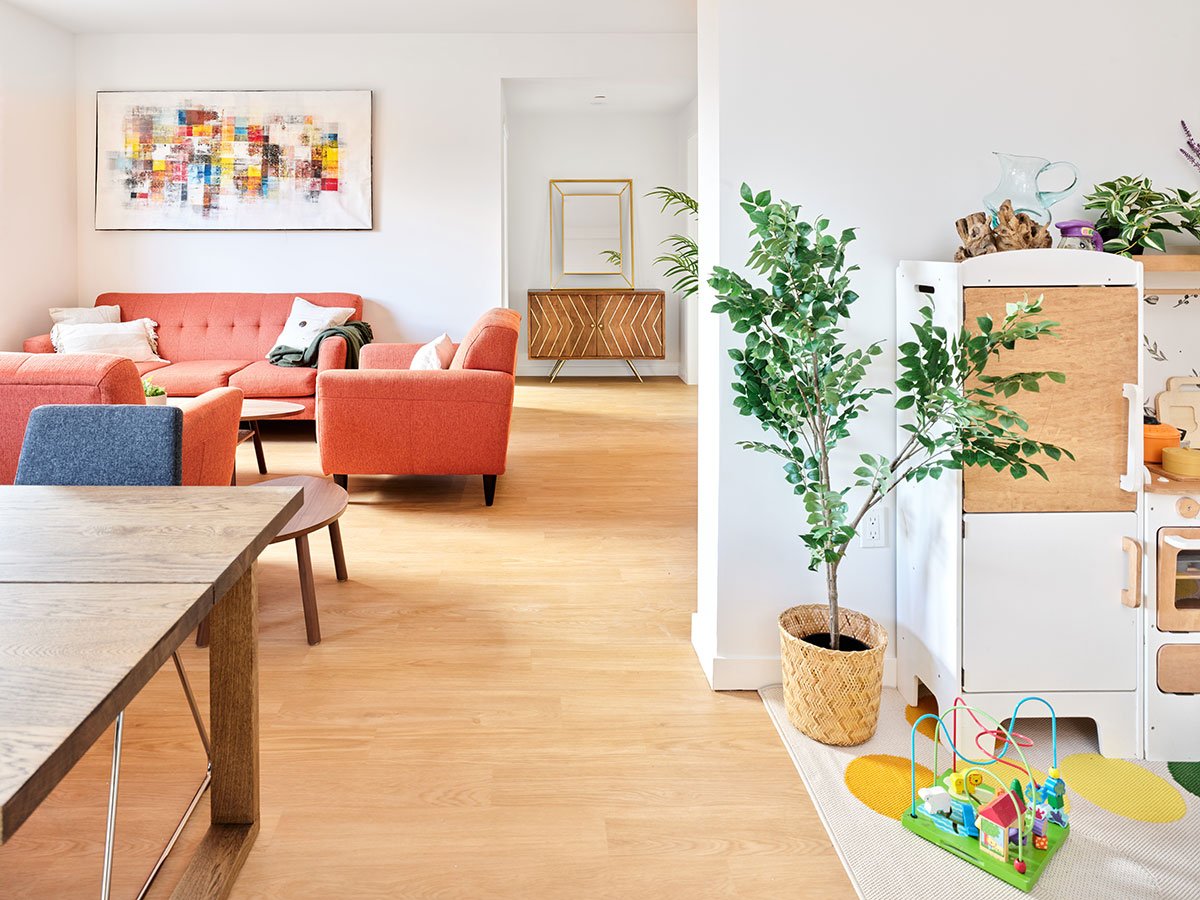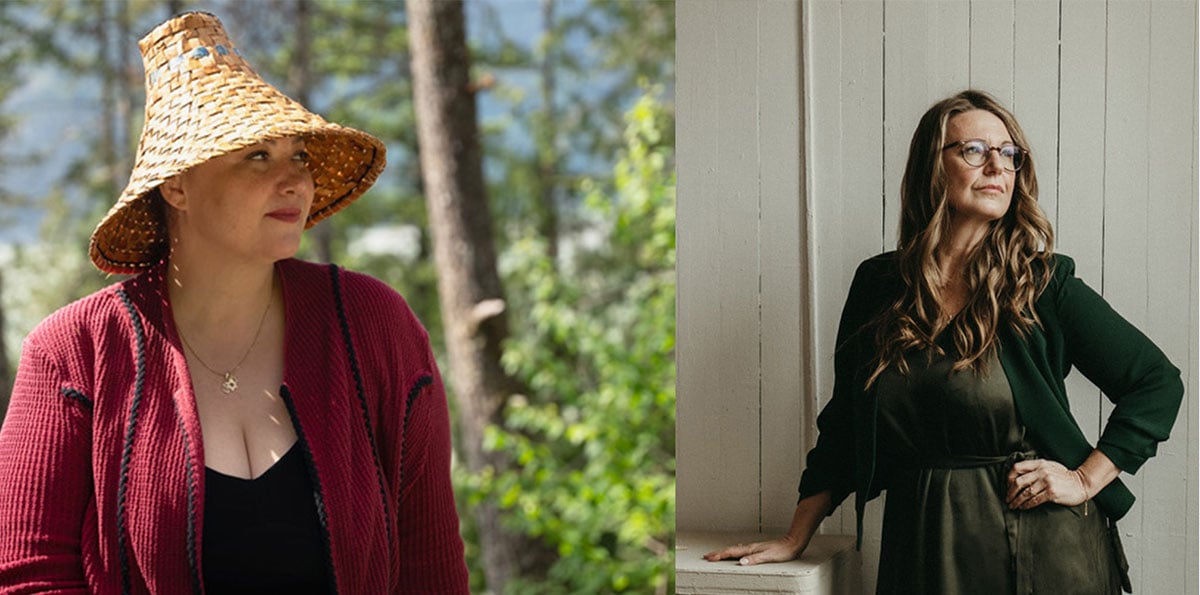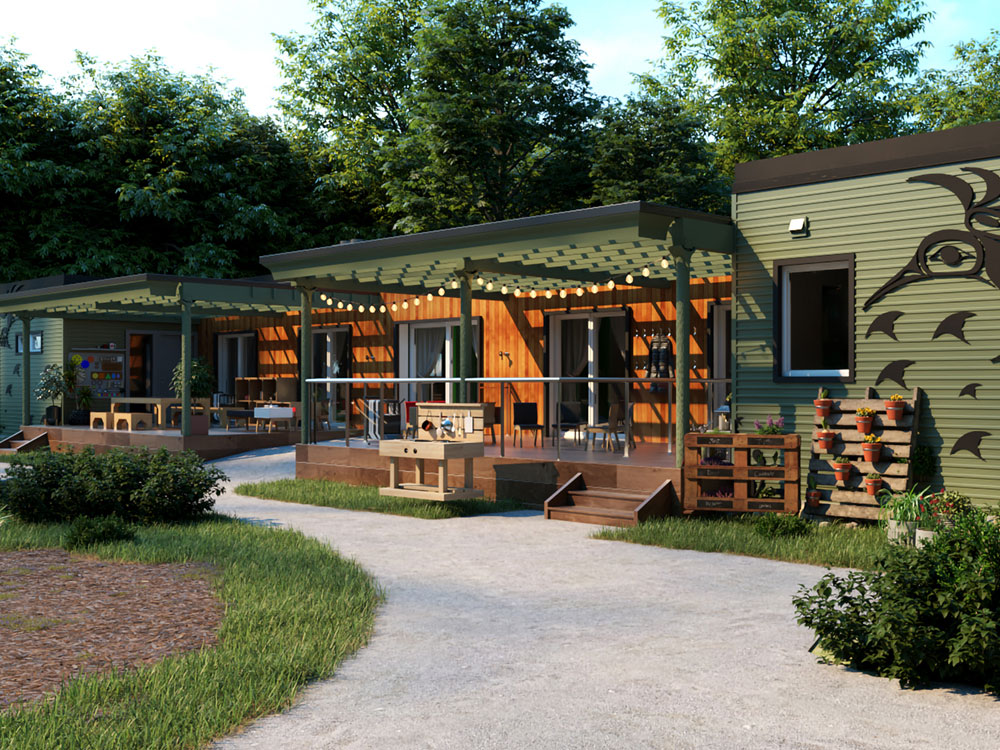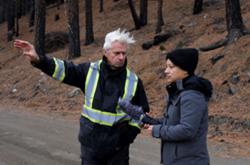Shortly after the province announced funding to increase child-care spaces to accommodate demand in 2018, Rory Richards approached her then boss at a modular construction company and suggested they get into building child-care centres.
“‘The government’s really taking it seriously, there’s investment in it, let’s do modular child care,’” Richards recalls telling her boss.
“They said, ‘Listen: I know you’re in the ‘baby zone,’ but we don’t build daycare here.”
That conversation was the impetus for Richards, who is of Coast Salish (Shíshálh) descent, to start NUQO Modular — a female-led, Indigenous-owned modular construction company that focuses on designing and delivering child-care spaces, classrooms and Indigenous housing in B.C. Richards founded the company in 2020.
In modular construction, the building parts are assembled in a factory, a process that takes place over a 12-week period, with on-site installation taking just five days, Richards said. The average time to prepare the site prior to installation — clearing the land, building a foundation, transporting the materials to the site — is about nine months. That means from breaking ground to occupation on a modular build takes just 12 months, much shorter than traditional construction, which can take multiple years.
With a couple of housing projects already under their belt, the company is now working on their first modular child-care centres in Fernie and West Vancouver. They have partnered with Natural Pod, another female-led, B.C.-based company, to furnish the centres with formaldehyde-free, adjustable classroom and play space furnishings.
NUQO’s modulars feature soft lighting, big windows and exposed cedar accent walls. Natural Pod’s furniture is constructed in B.C. from Forest Stewardship Council certified wood and is accessible for kids with physical disabilities, founder Bridgitte Alomes told The Tyee.

Alomes and Richards were introduced by mutual friend Sharon Gregson, spokesperson for the $10aDay child-care campaign in B.C. Their partnership, which began last year, is based on a “values alignment,” Alomes and Richards told The Tyee.
“We want communities to have access to beauty and to nature, first and foremost. And if we are going to be inside, let’s make sure that we’re in a really beautiful space that can be a hub for the community to be proud of,” Alomes said.
“There is a negativity surrounding modulars, because it really came out of oil and gas work camps, and just generally was not very high-quality construction. Nor did it look very good,” Richards said. “We knew it could be done better.”
Women are ‘a critical piece of the puzzle’
The province estimates it has helped fund 34,000 new child-care spaces since 2018, with help from the federal child-care expansion loan program. But many more spaces are still needed.
One pain point, Richards told The Tyee, is that there are only five architects in the province who know how to design a child-care centre. Another is that child-care centre design so rarely meets the needs of children or their early childhood educators, who are overwhelmingly women.
“There has been a lack of women represented on the design and construction side for far too long,” Richards said. “We offer a critical piece of the solution puzzle.”
That piece came from NUQO’s consultations with early childhood educators, child-care operators and other stakeholders on the design needs for early childhood care centres, to inform their child-care centre design.
“We tried to put ourselves in the body of an [early childhood educator] and look at every movement that they would make in a day, and see how we can either eliminate that movement or at the very least we could lessen it,” she said.
For example, including a pullout staircase under a change table so older kids can climb up, avoiding the need for their caregivers to repeatedly lift them on and off the table, potentially injuring themselves in the process.
NUQO also hopes their modular buildings can help with attracting and retaining early childhood educators for the field.
For example, the Fernie child-care centre, which includes 100 child-care spaces, is a partnership with the municipality and the province that includes 27 units of affordable housing, prioritized for early childhood educators, built above the child-care centre.

For rural communities with small populations like Fernie, child-care centres can double as community spaces. And for kids from marginalized families, Natural Pod’s Alomes noted, child-care centres are a home away from home.
“The schools become safe spaces. Often children are in their learning environments more than they are actually in their own homes,” Alomes said.
“It really will provide a strong message of support to these children and to their families, showing that they really do matter.”
Saving waste and time
NUQO’s modulars, assembled in western Canadian factories using domestic wood and European steel, are not cheaper than traditional construction.
But they reduce construction site waste and time, which translates into dollars because construction financing accrues interest, Richards said.
Since the modular builds are constructed in a factory, any dropped or scrapped materials like nails or screws are put back on the shelf or used elsewhere. In traditional construction, they would be thrown in the trash.
In a study of three modular housing projects funded by the Canada Mortgage and Housing Corp., RDH Building Science found reusing design templates for modular further decreases the building cost — which is greater than traditional construction — and shortens the build timeline. It also has the potential to be more energy efficient because units are constructed in a controlled indoor space, versus traditional construction that happens on site.
A lack of skilled labourers in remote communities is also not a problem when modular construction happens at factories elsewhere. However, this puts up a barrier for communities that wish to train locals to be skilled labourers during the build, the RDH review found.
Another difference is the versatility of where the modulars can go: any piece of land with water, sewer and electricity hookup capabilities. Modular construction is just as permanent as traditionally constructed buildings, Richards added.
“You could even put them on top of buildings, providing it was structurally sound,” Richards said.
Richards and Alomes hope their partnership will continue with child-care centre builds in more B.C. communities, with help from provincial and federal child-care space funding.
“We are excited and committed to delivering quality child care, not just to kids and parents, but also to educators,” Richards said. “We’re just as committed to them as we are to the kids.” ![]()
Read more: Education, Labour + Industry, Urban Planning

















Tyee Commenting Guidelines
Comments that violate guidelines risk being deleted, and violations may result in a temporary or permanent user ban. Maintain the spirit of good conversation to stay in the discussion and be patient with moderators. Comments are reviewed regularly but not in real time.
Do:
Do not: